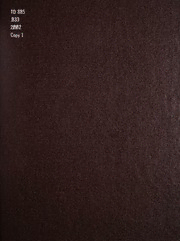
Background information document : national emission standards for hazardous air pollutants (NESHAP) for the friction materials manufacturing industry PDF
Preview Background information document : national emission standards for hazardous air pollutants (NESHAP) for the friction materials manufacturing industry
•4 ^ A* *' A> « AWMf W//SJ-) « <J-”~ ^ * Mj*®' * T«v.. J>, v5' ’Oz ^ _ - S% A , -5^0 a jC^" ^ „ s°:;*<,\> s^aJ^aX <X>x::X '■%* r°*\°!LL **, 9i > SLy??? * \.W r° »>* 4life'. «fev* ;Jfl|; ^ ' * '«f. O ** ,-r5S^\«S* * O A7 &!Vs J?-, + 'i >, O z, : -W •4I&* ♦w* *ifi|: w «« <^o* * -aj f»HO° .*%>' r-bz V»ntt^^ >NxO° v-* * o%:^y>.. . .v*1 V <A , V ** f? 5, % Oft -$P AV^X/Aap,. ^vVnJA ^ zAvWAAp A -*#111°, V? ° IPII*, "v^ -Mils ' - -«»* %,A ;* *v* - <* ^ <fj*S»' “f^amrr <ww :*(«5s f?i^aSpR^r: V\s - W&102 * 'Jj't=’ £ » vVA » A x . *,W; A5-w*; /\;M* ^ ”‘P*; -^ •' JlsaPo > .<V^ ^ * >°X>-c,.V-lo^..<■ ’■•> •l* V°cO-,,V^ - ^ <4 fX * <-I^N\ „tr vD ♦ tte/r??7-r, t> ■* *-». t .* «V* i> .^r ‘■«^3>„.t v v@^ao *** *xmrz o^X X^px v^0^ vSgBZ vX'’“0,,/‘' * o(V*-n »^°s . . , VU"0° <?X* * o,V- **4 '*¥*<■ ^ «4T * jjMBjA -St ^ *A¥4'' >, . % j? jS»%° %£? »P|'r V^ Xrss 0 JPII * V^ o aA cf5^n J o aA c55^r> o ^ o r v,w;/ \m*/ \”.W;/ \ A • • -..V" • ^ {*°co».<,\ •* * ‘ ’ <5>V l'.,V“ ' ‘* J> co»c,'- J-V <z4-* Cy */v+Oi^ 7 T‘t-o rV ^ A r>rs<N .P _vc^' v *A /»•^/y>>+j ^ Tt o- o-u/*, ^ 0 ^WrsTvA v\^ - *v° • v > * 4- *% ° • ^ 0^o-o,,V• * >,*-A;° • ^ /t„«,,\' • • *; ONC %/ °- ,4* t -tf "p ; Vc *■-*: \<?° ?*4H&* (£K£S ^ o yy ^aiWsS^ ° v- w^^v\°& . sf>• B^i*.r.> &» - “yr,v.u x<* *•<'£ -y ►*S*— w * " .,,. -.m. to ^3*J l*JV ^ ^ * <£> JV J ^IjisW o * _v ‘V ♦ * $ j? \ * ^ s ‘^..oo®, \,<’-'«*,‘'<l£V «w. '°.\-*^ 777 <4 <C tONG. 4tv * * <SN rO gc” V O-. > *«, -O &4°*X o* c°NG^ ^c/***^ **LI -c u * ^ 0 . <«* C: Mu//P2-. + *1 ^ O acP **,s5SStaL** ^ IV *"■* t ,o’ cq)*,'» ^°°5 « * * of\'«.-. » n * > * jMAc O < . &>$»• “ jg^t t s W, i o^jmjk *\4 p f||j|g ° O 1 ." «, .Cy* ^f.. ^ 0 ^y O l? ''r>V\v'r to WlTjIfc 4\y^/ ■ft <VJ> VJj ^ >t » S a ,o^y°r°*^V > °o O O A * \ ^ ^ ts . tf.<l # ^ov^ United States Office of Air Quality EPA-453/R-01-008 Environmental Protection Planning and Standards September 2001 Agency Research Triangle Park, NC 27711 Background Information Document: National Emission Standards for Hazardous Air Pollutants (NESHAP) for the Friction Materials Manufacturing Industry r, q EPA-453/R-01-008 Background Information Document National Emission Standards For Hazardous Air Pollutants (NESHAP) for the Friction Materials Manufacturing Industry Emission Standards Division U. S. Environmental Protection Agency Office of Air and Radiation Office of Air Quality Planning and Standards Research Triangle Park, NC 27711 September 2001 This report has been reviewed by the Emission Standards Division of the Office of Air Quality Planning and Standards, EPA, and approved for publication. Mention of trade names or commercial products is not intended to constitute endorsement or recommendation for use. Copies of this report are available through the Library Services Office (MD-35), U. S. Environmental Protection Agency, Research Triangle Park, NC 27711. (919) 541-2777, or from National Technical Information Services, 5285 Port Royal Road, Springfield, VA 22161, (703) 487-4650. lC Control Numbe' 2003 426119 I3W-1 VS» Table of Contents Page LIST OF FIGURES .vi LIST OF TABLES. vii LIST OF ACRONYMS AND UNITS OF MEASURE.viii 1.0 INTRODUCTION .-..1-1 1.1 Statutory Basis....•.1-1 1.2 Source Category Listing .1-3 1.3 References . . 1-4 % 2:0 FRICTION MATERIALS MANUFACTURING SOURCE CATEGORY.2-1 2.1 Industry Profile .,.2-1 2.1.1 Data Gathering .2-2 2.1.2 Industry Overview.2-3 2.1.3 Major Sources.2-5 2.1.4 Source Types Not Regulated.2-6 2.1.5 SIC and NAICS Codes.2-7 2.1.6 Small Businesses.2-7 2.1.7 Markets.2-9 2.2 Resin-Based Friction Materials Manufacturing Process.2-10 2.2.1 Raw Material Preparation.2-13 2.2.2 Forming.2-14 2.2.3 Curing.2-14 2.2.4 Assembling and Finishing.2-15 2.3 Characterization of HAP Emissions from Resin-Based Friction Materials Manufacturing Emission Units .2-15 2.4 Emission Test Data. 2-17 2.5 Existing State Regulations.2-17 2.6 References.2-18 3.0 EMISSION CONTROL TECHNIQUES..3-1 3.1 Condensers . 3-2 3.1.1 Factors Affecting Performance.3-3 3.1.2 Control Efficiency.3-4 3.1.3 Current Monitoring Practices .3-5 3.2 Carbon Adsorbers .3-6 3.2.1 Factors Affecting Performance.3-9 3.2.2 Control Efficiency.. 3-11 3.2.3 Current Monitoring Practices .3-11 3.3 Pollution Prevention Techniques.3-12 3.4 References.3-13 4.0 MACT FLOOR AND REGULATORY OPTIONS. 4-1 m Table of Contents (continued) Page 4.1 Clean Air Act Requirements.4-1 4.2 MACT Determinations .4-2 4.2.1 Performance of Solvent Recover> Systems on Solvent Mixers.4-2 4.2.2 Selection of MACT.4-5 4.2.3 Selection of the Standard .4-9 * 4.3 Monitoring Options.4-9 4.4 References.-.....4-12 5.0 MODEL PROCESS UNIT.5-1 5.1 General Approach .5-1 5.2 Solvent Mixers .%.5-2 5.2 References.'.5-3 6.0 ENVIRONMENTAL AND ENERGY IMPACTS .6-1 6.1 Basis for Impacts Analysis .6-2 6.2 Primary Air Pollution Impacts.6-2 6.3 Secondary Air Pollution Impacts.6-3 6.4 Water Pollution Impacts .6-5 6.5 Solid Waste Disposal Impacts.6-5 6.6 Energy Impacts .6-5 6.7 References.6-6 7.0 COST OF CONTROLS .7-1 7.1 Basis for Control Cost Analysis .7-2 7.2 Control Device Costs.7-4 7.3 Initial Compliance Costs.7-5 7.4 Monitoring Costs.7-5 7.5 Reporting and Recordkeeping Costs.7-5 7.6 Cost Effectiveness.7-6 7.7 New Sources .7-7 7.8 Small Businesses. 7-7 7.9 References.7-7 APPENDIX A. EVOLUTION OF THE STANDARD . A-l APPENDIX B. EMISSION ESTIMATION METHODOLOGY.B-l B.l Plant A.B-l B.1.1 Baseline and Uncontrolled Emissions.B-l B.1.2 MACI Floor and Beyond-the-Floor Emissions.B-2 B.2 Plant B .B-2 B.2.1 Baseline and Uncontrolled Emissions.B-2 B.2.2 MACT Floor and Beyond-the-Floor Emissions.B-6 B.3 Plant C .B-6 iv
